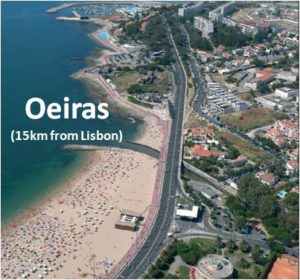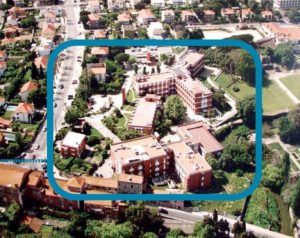Contents
Training School for Bioimage Analysts: Oeiras, 2017
- Place: Gulbenkian Institute of Science, Oeiras (Portugal)
- Dates: Feb 12 - 15, 2017
- Selected trainees: 25
- Trainers: 12
- For any question, please send it to neubias.analyst.course@gmail.com
Aims and Scopes
The aim of the course was at increasing the knowledge and the technical capability of bioimage analysts for improving their analysis quality. Participants were expected to be already fluent with at least one programming / scripting language and working on bioimage analysis in their daily life. During the schools developers of various image analysis tools showed us how to access API of those tools, and how to experience construction of workflows using available resources.
The school had four pillars:
- Tools & Spirit
- NEUBIAS activities and bioimage analysts
- Overview of bioimage analysis tools
- Learning Resources
- Code management, deployment, collaborations
- Coding and Libraries
- In depth access to bioimage analysis API
- e.g. ImageJ Imglib2 Ops, Imaris XT scripting
- Designing Workflows
- Learning constructions of cutting edge workflows
- Algorithms and Benchmarking
- Introduction to advanced algorithms for image analysis
- Benchmarking of algorithms and workflows
Through this school, we were not only aiming at sharing bioimage analysis techniques, but also at enhancing and strengthening the communication among bioimage analysts.
Schedule
Invited Speakers & Instructors
Martin Horn, Konstanz (Germany)
Jean-Baptiste Sibarita, IINS Bordeaux (France)
Sebastien Tosi, IRB Barcelona (Spain)
Curtis Rueden, Wisconsin (USA), to be confirmed
Florian Jug, Dresden (Germany)
Jürgen Reymann, Freiburg (Germany)
Michal Kozubek, Brno (Czech Republic)
Volker Bäcker, Montpellier (France)
Daniel Sage, Lausanne (Switzerland)
Jean-Yves Tinevez, Pasteur Institute, Paris (France)
Kota Miura, Heidelberg (Germany)
Jan Eglinger, FMI Basel ( Switzerland)
Venue & Access
The NeuBIAS 2017 training schools was hosted by the Instituto Gulbenkian de Ciencia in Oeiras:
The IGC is a research institute devoted to biological & biomedical research and graduate training. Excellence, originality, communication, cooperation and generosity, coupled with an outstanding infrastructure are the ingredients that make IGC a special place. Established (and still supported) by the Calouste Gulbenkian Foundation in 1961, the IGC was profoundly restructured in 1998 to form the institute that runs nowadays. Small independent research groups work in an environment designed to encourage interactions and exploit synergies, with minimal hierarchical structure. The scientific programme of the IGC is multidisciplinary, including Cell and Developmental Biology, Evolutionary Biology, Immunology, Host-Pathogen Interactions, Disease Genetics, Plant Biology, Neurosciences, Theoretical and Computational Biology. The IGC is home of the “UIC:Advanced Imaging Unit”. More Facts & Figures about IGC is here.
| IGC Address | R. Quinta Grande, 6 1780-156 Oeiras – Portugal |
| IGC URL | http://www.igc.gulbenkian.pt |
Contacts
Bioimage Analyst School Organization:
- Jean-Yves Tinevez: jean-yves.tinevez [at] pasteur.fr
- Kota Miura: miura [at] cmci.info
Local organization:
- Gabriel Martins: gaby(at)igc(dot)gulbenkian(dot)pt
- Anna Fejfer: amfejfer(at)igc.gulbenkian.pt
- Pedro Alves: ppalves(at)igc.gulbenkian.pt
Travel and accommodation
- Inatel (1.3km 15min walk): 40€single, 45€ double
- Hotel Riviera (2.9km): 67€ double, 77€
- Praiamar (3.1 km): 60€single, 70€ double
- Sana Estoril (7.7km): 55€single, 65€ double
Sponsors
Requirements
- A solid understanding and experience with Bioimage Analysis (demonstrated in motivation letter) and familiarity with programming languages, at least one!
- Must be able to attend all days/times of the course (no exceptions!)
- Must bring own laptop (minimum 4Gb RAM - this requirement may become higher)
- Must fill valid application form by November 30th (2016)
- Applicants are required to write a letter of motivation (include in registration form), and mention in the form their level of proficiency and interests, and propose a mini-project with goals for the course (e.g., a specific image analysis tool or workflow that they are interested in getting help with from our expert trainers)
- Must comply to administrative conditions and send confirmation of travel arrangements BEFORE December 16th (2016) after confirmation of selection (December 6th 2016)
Benefits
Followings are provided to the selected Training School participants:
- Lunch and refreshments during breaks, dinner.
- The course material (delivered electronically and on pen-drives)
- Participation to the NEUBIAS Symposium (15-17th of February, right after the Training School) is included for all training school participants – sessions + coffee breaks + lunches; bus Transfer to the Symposium on Feb 15 is also included.
- Gala dinner at the Symposium will be offered for applicants who submit an abstract before November 30th!
Complementary expenses, not covered by eligible expenses supported by COST, will be incurred to the participants. Check the application form for more details.
Not included
- Breakfast
- Travel and Accommodation (see below how to travel to the IGC and hotels nearby).
Travel Grants
NEUBIAS will offer competitive Travel Grants to a number of the Trainees applicants affiliated to institutions in COST member countries or Near-Neighbour Countries or approved European RTD Organisations (check definitions in Vademecum here). Please check in the application form how to apply for those grants by filling the additional fields enabling to submit a justification. The grants are supported by COST (funding body of the NEUBIAS Action). Eligibility and reimbursement modalities will follow the criteria/general COST policies (check the Vademecum here). Granted trainees will be notified by December 1st and grants will be executed after the Training School (daily signature on attendance sheets compulsory for grant winners). The grant amounts to ~900€ for travel and accommodation, to be reimbursed upon acceptance and after participation, according to COST rules (check the Vademecum here).
Selection Criteria
The criteria explained here applies to all applicants, including those who aims to be granted with travel supports from NEUBIAS.
Trainees will be selected strictly on the basis of their scientific motivations, as described in their motivation letter. Gender balance and geographical distribution will be taken into consideration according to COST policies, and only after pre-selection of eligible/suitable candidates and in the case that applicants are too numerous as compared to the number of available seats.





